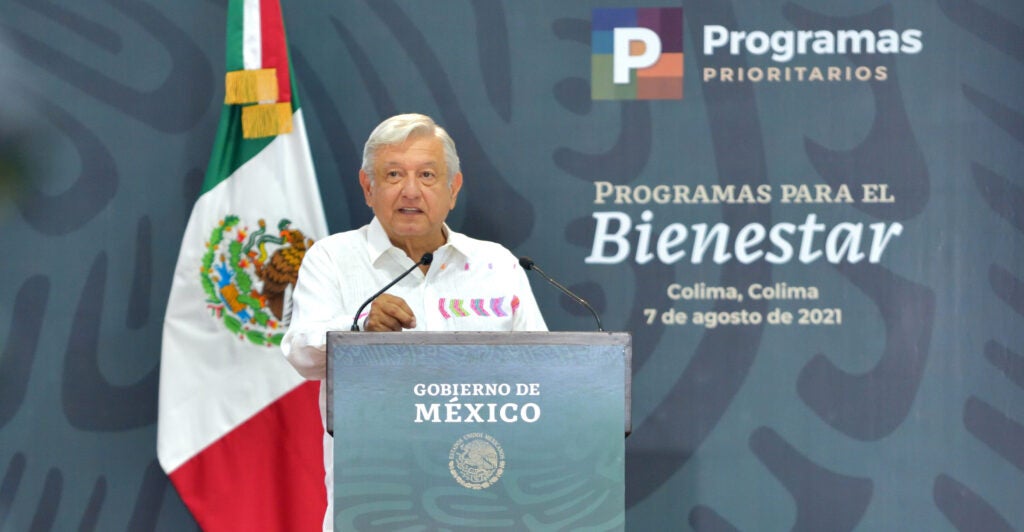Midway through his single, six-year term in office, Mexican President Andres Manuel Lopez Obrador continues his destructive misrule of Mexico.
His latest initiative has the potential to undermine further the rule of law in Mexico, a key indicator in The Heritage’s Foundation’s annual Index of Economic Freedom. (The Daily Signal is the news outlet of The Heritage Foundation.)
One of Lopez Obrador’s tried-and-true techniques has been to schedule frequent “referendum” votes in order to validate policies he wants to impose. Generally, only his socialist base shows up to vote in these plebiscites, and those voters can be relied upon to approve the policy outcome he seeks.
Those voters actually represent a relatively small fraction of the electorate, but Lopez Obrador proceeds to use their validation to implement his policies, generally to the detriment of the country at large.
That was certainly true of his decision shortly after taking office to cancel a new, 40% completed international airport in Mexico City. Shutting down construction ended up costing as much in cancellation fees as the completed new airport would have cost.
So, now Mexico is stuck with an antiquated airport in its capital city, but Lopez Obrador was able to boast to his low-information constituency that the money he “saved” by denying the elites a new airport would be redistributed to them.
As Mary O’Grady of The Wall Street Journal has pointed out, one of Lopez Obrador’s primary goals is to roll back his predecessor’s energy reforms and “return Mexico to the days of state monopolies in the energy industry and a highly centralized government submissive to an all-powerful president.” His leftist populism always relied upon redistributed, government-controlled income from the state-owned oil industry. That income also fueled corruption.
The Council on Foreign Relations’ Shannon O’Neil, in a 2019 column, “Lopez Obrador Is Dismantling Democracy in Mexico,” wrote that, from the beginning of his term, he “has relied on dubious public ‘referendums,’ sampling small and politically skewed groups to set agricultural policy, boost pensions, authorize infrastructure projects, and create scholarships.”
The Economist has called these frequent referendums “constitutionally dubious.”
Equally as worrisome, O’Neil reported, Lopez Obrador has attacked and weakened Mexico’s judiciary, cutting the salaries of judges and stacking the courts with political favorites.
Critics of Lopez Obrador’s most recent referendum, on corruption, have called it a “stunt,” “farcical … and designed to fail,” and “AMLO’s Cantinflan Show Trial.” (Cantinflas, who died in 1993, was probably the most famous comedian in Mexican history.)
As this year’s Heritage Index of Economic Freedom reported, Lopez Obrador inherited a deeply violent country, entrenched political and economic interests that often collaborate with transnational drug cartels, and sluggish economic growth. Nearly 60% of economic activity takes place in the informal sector.
To his credit, however, Lopez Obrador did support the new U.S.-Mexico-Canada trade agreement.
As president, Lopez Obrador has pursued anti-corruption measures very selectively (as reflected by this referendum). He has also implemented costly, regressive, and nationalistic economic policies, such as reversing his predecessor’s education and energy reforms. None of those steps will contribute to sustained economic growth.
Mexico’s scores on judicial effectiveness and government integrity in the economic freedom index are on par with those of an average developing country, not an emerging market.
If Lopez Obrador were serious about fighting corruption, one of his major campaign promises—instead of using anti-corruption statutes to persecute his political enemies—would be to strengthen the independence and effectiveness of Mexico’s rule of law institutions. To date, he has done precisely the opposite.
Have an opinion about this article? To sound off, please email letters@DailySignal.com and we’ll consider publishing your edited remarks in our regular “We Hear You” feature. Remember to include the url or headline of the article plus your name and town and/or state.
